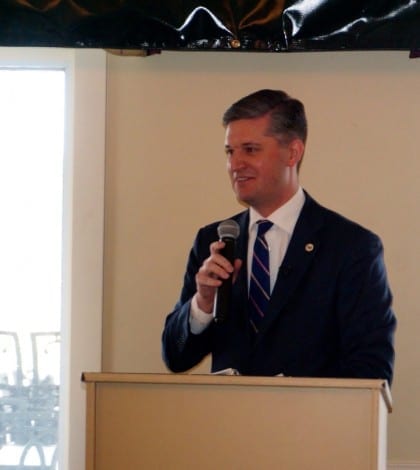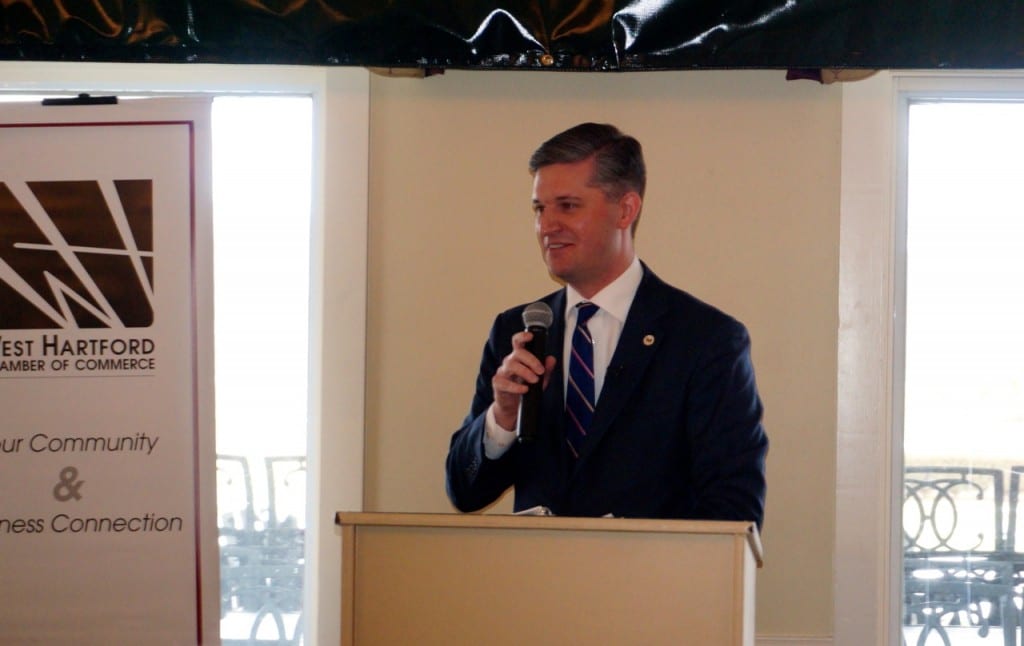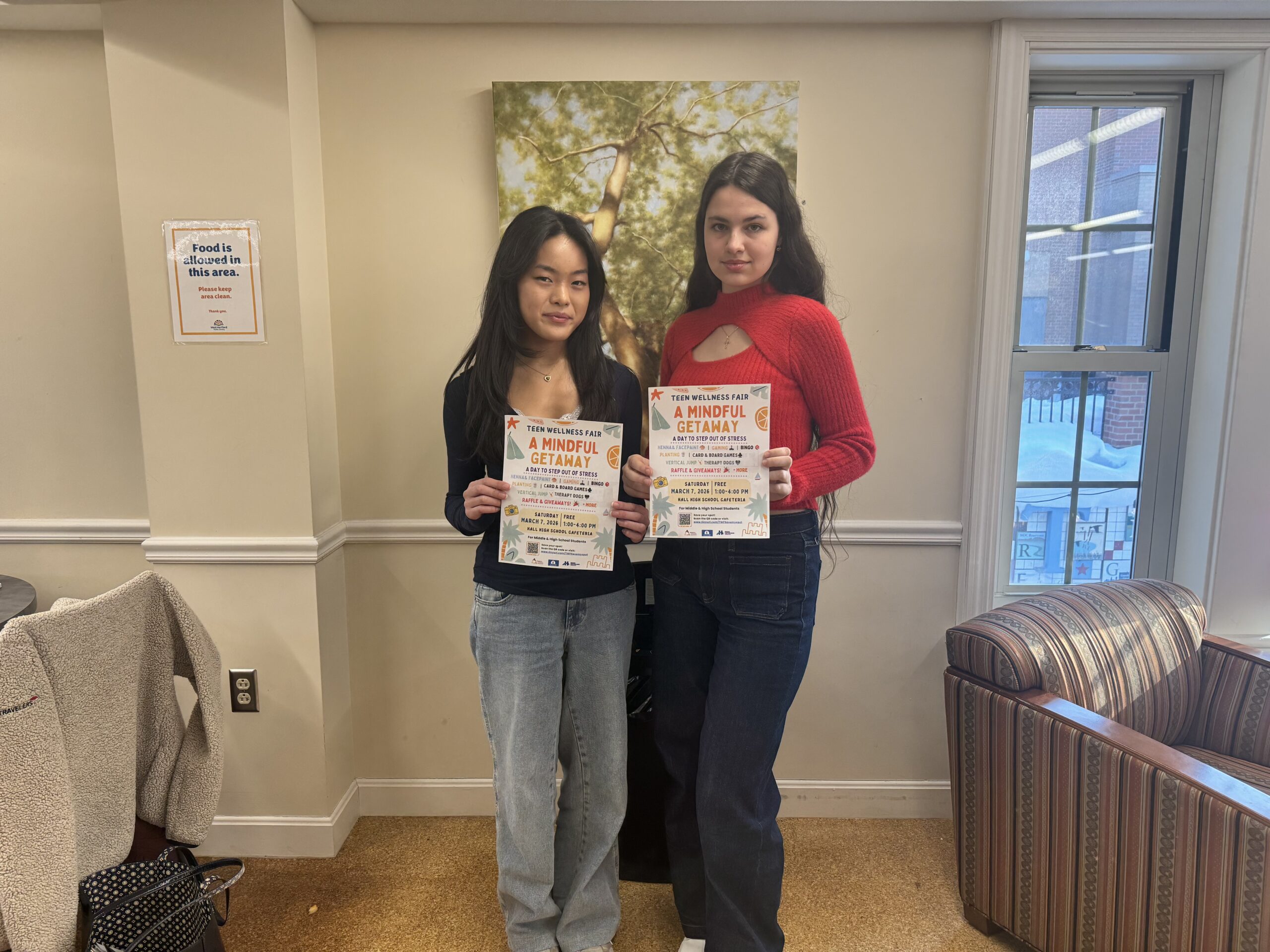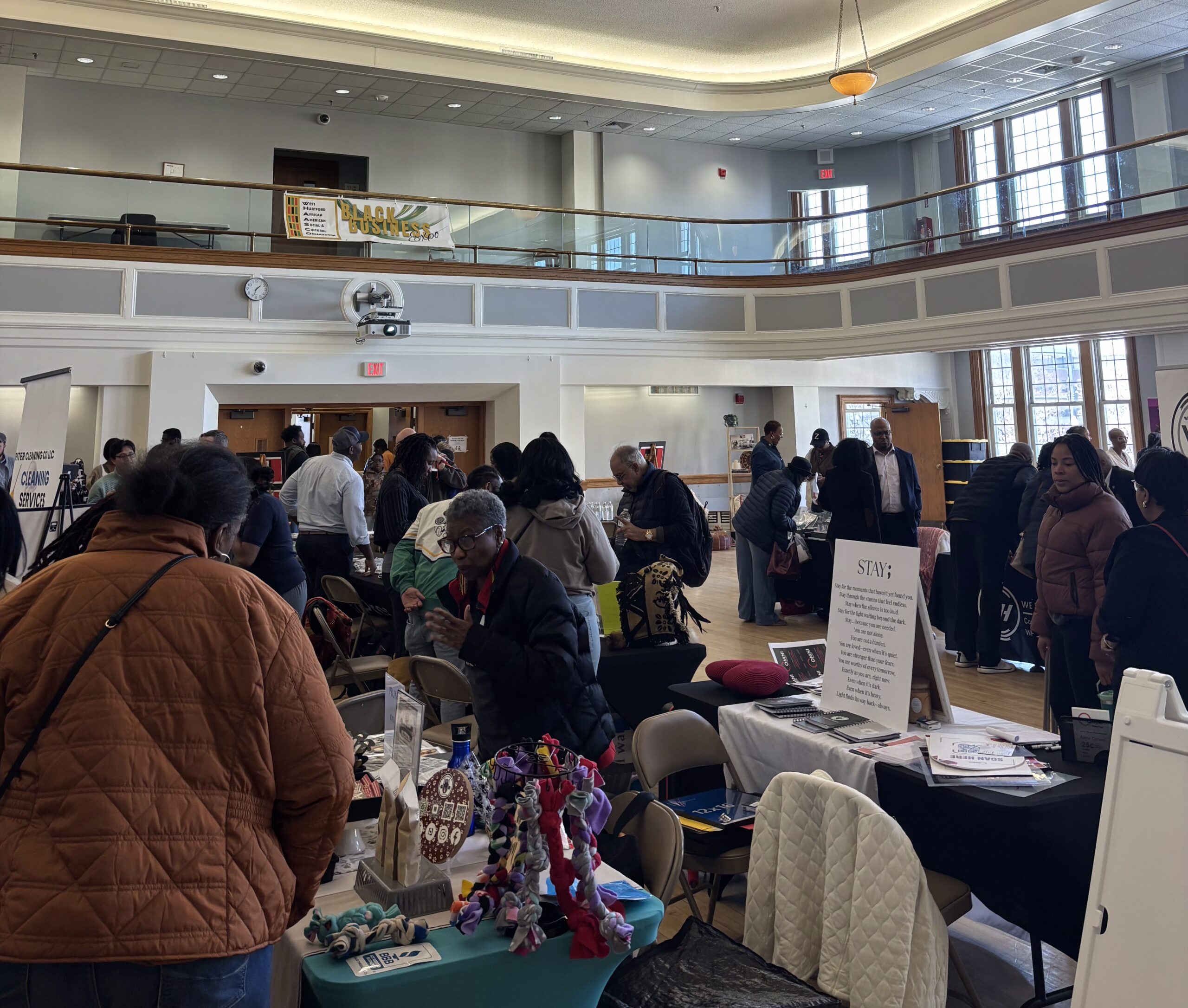West Hartford Mayor: ‘State of Town is Very, Very Strong’

Audio By Carbonatix

Scott Slifka. Photo credit: Ronni Newton (we-ha.com file photo)
West Hartford Mayor Scott Slifka told the audience at the annual ‘State of the Town’ address that future opportunities, as well as challenges are ahead.

Mayor Scott Slifka addresses the West Hartford Chamber of Commerce in what will be his last State of the Town. Photo credit: Ronni Newton
By Ronni Newton
West Hartford Mayor Scott Slifka stood at the podium at Wampanoag Country Club Thursday at the Chamber of Commerce’s annual “State of the Town” luncheon, and told the packed room that they probably wouldn’t be surprised to hear him say that the state of the town is “very, very strong.”
What the audience was surprised to hear came at the very end of Slifka’s speech, when he admittedly “buried the lede” and announced that he will resign as mayor this spring.
Before Slifka’s shocking announcement, kept secret until that moment from all but a handful of people in the room, he outlined exactly why he believes West Hartford has been, is, and will remain a successful community.
Slifka said that as mayor, he feels responsible for everything that happens in town – much like the mayor character played by Al Pachino in the movie “City Hall” who says he “wakes up every day and feels responsible for a bird that dies in Central Park.”
Although that’s extreme, Slifka said, the real world example is when he reads Business Buzz every Monday he has heart palpitations if bad news comes out. “Every time one of those comes out I feel that very personally. If there is a business that has announced that it is closing, for whatever reason, I feel somewhat responsible and that’s a hard burden.”
Despite the occasional bad news, the state of the town, however, remains very strong, as evidenced by the AAA bond rating just reaffirmed this week by both Moody’s and Standard & Poors.
In assessing the state of the town Slifka said he doesn’t gauge success in terms of awards, of which West Hartford has won many, but instead always asks the following five questions:
- Are we keeping you safe?
- Are we educating your kids?
- Are you getting value for your home and tax dollars?
- Are we creating an environment for economic growth?
- Are we leaving a responsible legacy?
Regarding keeping residents safe, Slifka said, “If we’re not, none of the rest matters.”
He praised West Hartford Police Chief Tracey Gove for the progressive practices of the police department in areas like school safety, use-of-force training, department policies on de-escalation practices, and diversity recruitment.
The West Hartford Police Department has also made community outreach a priority through initiatives like the citizen and college academies, assigning a police officer to work directly with residents in the Hillcrest neighborhood, and field training with social service agencies.
Crime in West Hartford has decreased 3 percent as compared to last year, he said. Accident rates have remained the same after a three year decrease, and DUI arrests have decreased 20 percent over the last four years.
The fire department, under the direction of Chief Gary Allyn, will be taking over paramedic service in the town, “saving the town money, making us safer … and it’s going to bring in revenue to the town. Where have you ever heard of town and union working together and lowering costs and bringing in revenue?”
On the education side, Slifka praised Tom Moore as “the best superintendent ever.” Both high schools have been recognized in the top 1 percent by both Newsweek and U.S. News & World Report, he said, although one ranked Conard higher and the other ranked Hall higher, continuing to “fan the flames of the local rivalry.”
Most exciting, Slifka said, is the new Charter Oak International Academy which is on budget and scheduled to open as planned on Aug. 31, with the addition of Mandarin Chinese and more programming for gifted and talented students. Magnet applications have already doubled, he said.
As for value for home and tax dollars, Slifka said that home prices have held constant and are competitive with our neighboring communities with good sales numbers other than for high-end homes.
Union contracts have a major impact on taxes, and Slifka praised the work of Executive Director of Human Resources Rick Ledwith for work he has done in negotiating with the town’s 21 collective bargaining units. “In our experience [unions] have been terrific.”
Six have tentative agreements signed and about to be ratified, and all address critical elements such as instituting hybrid pension plans for new hires, mandating high deductible health plans, and removing the sick pay at retirement benefit for new hires. The newly-ratified contract with the teacher’s union will save taxpayers $700,000 through health care reform, Slifka said.
The past three budgets have minimized tax increases and there have been surpluses the past five of six years. Although the town’s budget for the next fiscal year is still in the development stage, at first look it appears that there will be a 4 percent increase, driven by an actuarial error in the pension calculation that will add $2.6 million. “Believe me, we will be working to get that number down … keep my word that we understand the climate we are in.”
“The short answer is yes, very much so,” Slifka said regarding whether West Hartford is creating an environment for economic growth. “One evidence of that is the bags under the eyes of myself and the other Council members who have gone through the excruciating zoning hearings that we have had on a regular basis.”
The development details will be highlighted by Director of Community Services Mark McGovern during his presentation to the Chamber of Commerce in March, but Slifka said that a massive number of residential and commercial projects have come online recently – including 97 units in three residential projects and three large commercial projects that have created 85 new jobs. In the pipeline are nine residential projects which will add almost 800 units and three commercial projects that will add roughly 210 jobs.
“We are a place that people want to be and they are willing to invest,” Slifka said, and the good news is that it’s been happening all over town – not just in West Hartford Center. The largest residential project in the town’s history is on Park Road, he said, referencing Arcadia Crossing which was just approved by the Council earlier this month and will benefit not only West Hartford but also Hartford which is right across the street.
“And none of these are subsidized … We do this all ourselves,” Slifka said.
Although West Hartford has momentum, Slifka did caution that it’s a delicate thing to sustain. Because the town is 84 percent residential, the town must target property assemblages, identify market needs, and do things that are appropriate for our neighborhoods.
“In 2016 we are going to pursue transit-oriented development in the New Park area corridor,” Slifka said. The town has a grant to study ways to make that area more pedestrian friendly.
We need to create zoning that will attract development that want to be there in five or 10 years. “We need to consider, are we willing to build a little up – not skyscrapers but modestly up so that we can increase residential and commercial development.”
The town will also have a keen eye on affordable housing, said Slifka.
The town has some challenges, Slifka admitted. The largest is pension liability, a great source of frustration that’s a historically long-term problem and requires a long-term solution. The actuarial error has increased the contribution, but the anticipation is that the town will be 53 percent funded in 10 years.
Smaller on a grand scale, but more on the minds of many residents, is parking, Slifka said. The kiosks “are not loved by all,” but use is up, tickets are down, and the “parking numbers are robust.”
Closing of businesses should not be blamed on parking, he said, and the evidence proves it. Closings are based on either the changing retail landscape or national decisions impacting stores like Walmart and Chicos. “The kiosks are here to stay,” said Slifka, although the system is very flexible and the goal will be to “ensure a positive customer experience.”
The final question, Slifka said, is: “Are we leaving a responsible legacy?”
“I think we have a legacy that is so good that the state can learn from West Hartford,” he said. West Hartford, as a sophisticated community and an expensive place to live, with pockets of wealth and pockets of poverty, is analogous to the state as a whole.
People want to live here, and West Hartford has succeeded because we’re transparent. “We have succeeded because our residents demand results … we’ve strongly identified our core values of strong education, vibrant neighborhoods, a willingness to adapt to changing conditions, which means we have a common mission.”
Watershed moments in the town have included forward-looking zoning changes, commitment to pension and healthcare reform, Blue Back Square, the fire department paramedic contract, the construction of Charter Oak, and the decision never to offer tax breaks.
“We’ve avoided investing town money in projects that are outside our mission … which is kind of why you don’t see stadiums in West Hartford.”
Future challenges and opportunities, Slifka said, include the UConn property, but he doesn’t think that’s going to be the most important one. The New Park-Elmwood corridor will afford much more opportunity, and the “true next fork in the road is whether the town can get comfortable with some of the zoning changes that might happen which would have us build a little bit up in our commercial centers.”
Slifka outlined 10 recommendations to the state based on West Hartford’s successes:
- Cheerleading is not enough – you need buy-in
- You get what you pay for but you also need to explain the value by keeping residents informed
- Government can’t do it alone but neither can business
- Pick what you can do and what you can’t, and make difficult choices
- Think big but stay in your lane by building on your fundamentals
- Break some steady habits, think about things on a more regional basis
- Yes, unions can be your partners
- Market regions, not the cities – for example not the City of Hartford but ‘The Hartfords’ (West Hartford, East Hartford, and Hartford)
- If they can’t get here they won’t come
- Focus on the workers and families of the future, the new urbanism, telecommuters
Thursday’s address would be Slifka’s last State of the Town address as mayor.
In his closing remarks Slifka revealed that he has been promoted to the high-level position of deputy general counsel for the LEGO Group, and has made the bittersweet decision to resign as mayor following the conclusion of the budget process this spring. For details about the announcement, click here.
Like what you see here? Click here to subscribe to We-Ha’s newsletter so you’ll always be in the know about what’s happening in West Hartford!




Slifka’s comment that real estate sales are good, other than high-end homes, may be a throw away line but it deserves careful attention, If you ask most local realtors, they will say that high end homes in WH are not selling primarily due to the unrelenting and outrageous property taxes on these homes (which people simply are no longer willing to pay). Buyers of homes over $1M (which frankly is not a lot of money in most parts of the county) are now facing property taxes of at least $30,000 (if not more). This has made many of these homes largely unsellable – and no one is really talking about this. More importantly, this will have a profound effect on the re-evaluation later this year as it will likely result in a much higher mill rate due to lower property vales, especially at the higher end (which then trickles down), Property taxes in this town are a real problem – and we have now reached a tipping point that will have substantial impact on sales going forward.